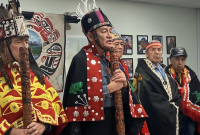LNG pipeline dispute polarizing some BC communities

A natural gas pipeline project has polarized many communities across northern British Columbia in a dispute a Wet'suwet'en elder says he hopes will be resolved through dialogue.
Russell Tiljoe, 83, has long-established ties with the First Nation whose hereditary clan chiefs say the Coastal GasLink project has no authority to run through its 22,000 square kilometres of traditional territory without their consent.
His own late father was one of the clan chiefs, but Tiljoe is not a hereditary chief because he said the governance system is traced through the female family line.
"I'm honestly sitting in the middle and not taking sides," Tiljoe said in an interview from Houston, B.C., the nearest town to a Coastal GasLink site at the centre of the dispute.
Coastal GasLink is building the 670-kilometre pipeline from British Columbia's northeast to Kitimat on the coast. The company has signed agreements with all 20 elected First Nation councils along its path, but the hereditary clan chiefs who are leaders under the traditional form of governance say the project has no authority without their consent.
Last year, the conflict inspired rallies across the country when RCMP enforced an injunction and arrested 14 supporters of the hereditary chiefs who blocked access to a logging road leading to the work site on Wet'suwet'en traditional territory.
The B.C. Supreme Court expanded the injunction Dec. 31 and the hereditary clan chiefs responded with an eviction notice to Coastal GasLink, leading to a new standoff.
Tiljoe said he hopes the dispute doesn't come down to a physical confrontation and that it can be resolved through dialogue between the Wet'suwet'en hereditary clan chiefs and the provincial government, as well as between the hereditary chiefs and those who are elected to administer reserves.
"It may take a long time to be able to come to a consensus agreement, but it is there, we just have to find it," he said.
Tiljoe said the project has created some tension in the community. Four years ago, he said he spoke in favour of considering the potential economic benefits of the project at a meeting in the feast hall, where Wet'suwet'en decisions are made under the traditional governance structure.
"Since then, there are a lot of people who will have nothing to do with me. If I'm not against it, then I'm for it, the way they see it," he said.
The hereditary clan chiefs have made it clear they will never support the project. At the other end of the spectrum, Premier John Horgan declared this week that the provincially permitted project will be built, and the rule of law must prevail.
Everyone, from the chiefs to the company and the RCMP talk about their commitment to dialogue, but so far dialogue hasn't solved the impasse.
Na'moks, a spokesman for the hereditary clan chiefs who also goes by John Ridsdale, suggested that expecting full agreement within any community is unrealistic, just as it is at any other level of government.
"Why do you think there are three elected parties, do you think they all get along?"
Still, he said the number of Wet'suwet'en members who support the project is "quite small and limited," compared with local opponents.
Coastal GasLink says the hereditary clan chiefs have not responded to requests to meet, while Na'moks has said the chief will only meet with leaders in the provincial and federal governments.
The project has also divided non-Indigenous neighbours of the Wet'suwet'en and local leaders are being cautious about how they talk about the project.
Local MLA Doug Donaldson declined an interview request, deferring to Horgan's comments.
New Democrat MP Taylor Bachrach, who represents the sprawling northwest corner of the province including the area of dispute as well as several communities that support it, would not say if he supports the pipeline or opposes it.
"This is a really difficult and divisive issue for our communities and our region," he said, adding his focus is on safety and encouraging open communication.
Bachrach said he's hopeful disagreements, like how RCMP operate in the area, can be resolved through negotiation.
"At the same time, there are big unanswered questions at the heart of this issue, and I don't think those larger questions are likely to be answered in the coming days."
Since Bachrach made those comments, RCMP set up a checkpoint with a stated intention to prevent the dispute on the road from escalating, but the checkpoint itself has become the subject of a complaint by the B.C. Civil Liberties Association after two people were denied entry.
Gladys Atrill, the acting mayor of Smithers, a town about 45 minutes from the entrance to the logging road, said council is also not taking a position on the project, although it has a good working relationship with the hereditary chiefs whose office is their town.
She said some members of the community are employed by Coastal GasLink or its contractors but couldn't say if the division of opinion lands for or against the pipeline. There are strong views on either side but also a "milieu of people in the middle," and she believes the majority of people are most concerned about safety, Atrill added.
"Smithers is a diverse community. It's a huge strength in community but of course it means people see things differently."
Atrill said she hopes those directly involved in the conflict "hold fast, be cautious," and remember that safety is primary.
"I would rather we take a little more time than do something we might regret," she said.
This report by The Canadian Press was first published Jan. 18, 2020.




Comments
"so far dialogue hasn't solved the impasse…"
Why is it that whenever I see a statement like that, it reads like, "So far, those damn injuns haven't figger'd out that the pipe is going through, whatever they want?"
WE STAND WITH YOU, BRAVE WET'SUWET'EN!
http://ecoreality.org/wiki/Statement_in_support_of_the_Wet%27suwet%27en
RECONCILIATION !
RECONCILIATION !